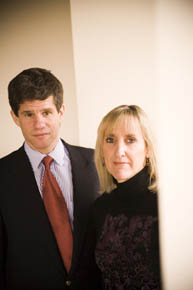Surviving cancer once cured
Innovative rehabilitation program redefines patients' physical and emotional lives

Dr Steven Grover and Marla Gold, directors of McGill's Cardiovascular Health Improvement Program (CHIP), believe exercise therapy inspires cancer patients to take control of their condition, resulting in more self-sufficiency, less hospital time and better quality of life.
CLAUDIO CALLIGARIS
Cancer survivors often assume that, once successfully treated, they will return to their former routines. But what happens when feelings of fatigue, depression and helplessness trump feelings of hope and wellness?
Since January 2006, recovering patients at the Royal Victoria Hospital have turned to McGill's Cancer Nutrition-Rehabilitation (CNR) Program, a comprehensive therapy initiative that helps cancer survivors reach their health potential within the limits imposed by their disease.
The original program was the brain child of Dr. Neil Macdonald, an internationally recognized palliative care physician, who initiated a rehabilitation program for patients with advanced lung cancer alongside Dr. David Small, a pulmonary physician at the Jewish General Hospital, Dr. Gerald Batist, the director of McGill's Department of Oncology, and Mary-Ann Dalzell, an experienced physiotherapist. Thanks to a generous donation from the Ridell Family and the Webster Foundation, the program paved the way for cancer rehabilitation through nutrition and exercise.
"Cancer is all about loss. You can lose your health, a breast, a lung," said Dr. Martin Chasen, a medical oncologist and the director of McGill's CNR Program. "Though technically cured, a patient will come out of the experience a physical and emotional wreck."
Chasen first recognized the constraints of cancer treatment while working as a palliative care specialist in his native South Africa. Even when his patients received a clean bill of health, he had trouble accepting that his job was finished.
"I couldn't just say, 'Your chemo is over, there is nothing more I can do for you,'" he said. "I've since realized that there are two Cs in cancer: one for cure, one for care. If you can't guarantee the first, you must provide the second."
Since joining the university's oncology team in 2004, Chasen has expanded the CNR program to include not only physicians and nurses, but also dieticians, physical and occupational therapists and — more controversially — psychologists.
For Chasen, this "no-one-doctor-in-charge" philosophy empowers the patients by ensuring that their needs — whether physical or psychological — dictate their eight-week treatment.
A team effort
This September, the CNR further broadened its scope by joining forces with the McGill Cardiovascular Health Improvement Program (CHIP), led by clinical epidemiologist Dr. Steven Grover and program director Marla Gold.
Now, once patients graduate from the CNR program they can move on to a 12-week individualized physical exercise program at the CHIP base in the Atwater Club.
"Exercise is a key component of recovery because it reduces — if not obviates — the need for medication. The worst thing you can do for a recovering patient is put them in bed to rest for three months," said Grover, whose research confirms the importance of exercise in healing.
Established in 1996, CHIP functions like a highly monitored gym, where specialized exercise physiologists follow groups of six to eight patients through two or three weekly exercise sessions. Each time, the team of physiologists, nutritionists, psychologists and doctors readjust their patients' exercise prescriptions based on their progress and feedback.
Beyond personal healing, the rehabilitation program acts as a support group for cancer survivors, who get to witness each other's improvements in fitness and mood. Chasen believes that this solidarity, along with the simultaneous intervention of specialists, guarantees better recovery. "In my 25 years as an oncologist, I've come to realize that the patients who do well are those who take control."
Funding healing
With both the CNR and CHIP teams relying on private donations, fundraising plays a crucial role. The exercise program alone costs over $1,000 per patient — a fee that isn't covered either by Medicare or health insurance. Still, the directors would rather charge half the price than give up on their patients.
"We never turn anybody away," said Gold, who hopes the data collected from the pilot group will convince the provincial government to fund the program.
For Grover, rehabilitation is the logical solution to reducing the stress on hospital resources and keeping patients out of the welfare system.
Government funding could also help create a comprehensive health improvement centre that would provide not only rehabilitation but "prehabilitation" — exercise and nutrition therapy prior to surgery and treatment. Eventually, cancer survivors across Quebec would be able to benefit from the program.
Just at the thought of it, Chasen couldn't help but smile.
"If you don't get moved by cancer, nothing will move you. But to think that all cancer survivors could participate in the program? Now that would be wonderful."
McGill's Cancer Nutrition-Rehabilitation (CNR) Program will release in January 2007 a promotional video created by its patients. For information about the CNR, please visit www.mcgill.ca/cnr. For details on the McGill Cardiovascular Health Improvement Program, see www.chiprehab.com.

